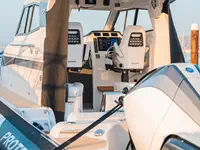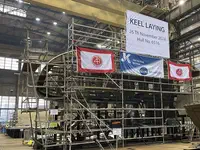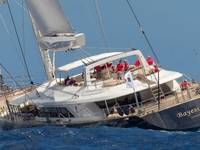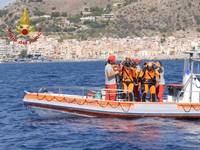John Dane III Leaves His Mark
“The 2008 financial crash slowed the luxury business, and the new class warfare coming out of Washington has made owning a large yacht out of favor. Hopefully, this class warfare will change this November and maybe put hundreds of laidoff workers back to work.”
In the more than two years since its founding, Mississippi-based TY Offshore, the former Trinity Offshore, has invested in a new yard in Gulfport and repaired its storm-damaged New Orleans holdings. The company has doubled its capacity and racked up new orders, president and CEO John Dane III said. TY Offshore designs and builds offshore barges, tugs, oilfield-support vessels and spill-response and patrol vessels.
The company's new name, adopted in late June, should make business simpler. “We decided to rebrand for two reasons,” Dane said. “One was to eliminate any confusion in the marketplace with Trinity Industries’ marine products division.” Trinity Industries, Inc. in Dallas is the nation's largest, inland barge builder.
Dane said “the other reason is that having TY in the name shows a connection with a company that's been producing sophisticated vessels for over 24 years.” TY Offshore is operated separately from Trinity Yachts, LLC, which was founded in 1988, though the two share management and facilities. Trinity Offshore was launched in New Orleans just before the BP spill in April 2010.
Another benefit of the name change, though Dane didn't mention it, is that a firm in Singapore is also called Trinity Offshore.
Dane's Trinity, now TY Offshore, hasn't sat still since its founding. “We've spent over $70 million on capital expenditures since Hurricane Katrina devastated our New Orleans shipyard on the Industrial Canal,” Dane said. “Right after the storm, we acquired a dormant facility in Gulfport from VT Halter that we've expanded by adding another two production buildings, a 3,325-ton synchrolift, a 550-ton travel lift, a panel line and multitude of other equipment. This is on top of totally refurbishing the New Orleans facility.”
The company's two, large production facilities contain more than 1.1 million square feet of under-cover fabrication area. “This gives us an advantage in working conditions since typical problems with rain days are eliminated and employees can work in the shade,” Dane said. “These factors help us attract really top-level employees, and our Gulf Coast location gives us access to probably the largest pool of experienced ship builders in the world.”
Another company strength is combined experience. “My partners and our top-level management have been in the business for over 25 years and some of us over 35 years,” Dane said. In house-engineering capabilities are another major strength. “We're able to help our customers create new designs that will meet new demands from their clients,” he said. Workmanship and delivery times benefit from having engineering on the premises.
On July 25, TY Offshore and FMT Industries, LLC christened and launched FMT 3242, which was built in Gulfport and is the first of ten 297’6” 30,000-barrel tank barges that TY is producing. The barges will be launched in thirty-day intervals. So far, construction has been on time and on budget.
Business Is Brisk & TY Is Hiring
As for the next few years, Dane said “our backlog with Harvey Gulf is two and a half years for Platform Supply Vessels and our inland tank barge business with Florida Marine Transportation is two years, so we see steady work for awhile.” And he said inquiries for offshore and military projects will likely to add to its backlog.
Changes in the regulatory environment since the spill have affected TY and firms across the Gulf Coast. “The slow permitting process in the Gulf set us back 18 months ago--when we had a PSV order pending,” Dane said. “But the permit backlog is being attended to now. The good news-bad news is that so many shipyards are full with work that the pool of experienced workers that were readily available and looking for work is getting smaller.” The company has responded with in-house training and by coordinating with local authorities to train workers. But Dane said “that drives up our costs.”
He also said “we wish that the unemployed workers we read about in the news would consider blue-collar trades, which can be high-paying careers.” In late July, TY Offshore was looking for another 50 welders and shopfitters.
Dane gave an example of tough, new regulations. “In a recent application for a bulkhead to allow for construction of larger, offshore power barges, the Mississippi Dept. of Environmental Quality told us we couldn't get a bulkhead permit--unless we could show we had an air permit for the start-up of gas turbines that will be mounted on the barges. We've never been asked before to permit for emissions on the vessels we're building.”
When asked about safety in the Gulf since the BP spill, Dane said “I believe that all offshore company executives are stressing safety over schedules now. In conversations, it's obvious that none of our customers want to have their names or their company appear in a news report concerning accidents or death.”
He continued “at TY Offshore, we emphasize worker safety in all that we do. Increased awareness will lead to increased safety. In that regard, you could say the industry is safer following extended publicity in the wake of the BP spill.”
Nibbling Away At The Jones Act
In other industry developments, Dane said he's worried about continual attacks on the Jones Act. “A recent letter ruling by Justice Department allowed for foreign flag ships to deliver certain oil field products to the Outer Continental Shelf from a U.S. port. This was never allowed in the past. It's simply an interpretation by a bureaucrat that slowly nibbles away at the Jones Act.”
He added “then we have senators like Arizona's John McCain, who thinks we should do away with the Jones Act altogether.” Dane said the nation's marine industry needs to be diligent to protect the Jones Act.” U.S. cabotage laws, known as the Jones Act, require commercial vessels transporting merchandise between ports in the United States to be built, owned, operated and manned by U.S. citizens and be registered under the U.S. flag.
Oil Industry Is Promising But Yachts Have Been A Tough Sell
Dane is optimistic about the global oil business over the next few years. “Turmoil in the Middle East and the crazy administration in Iran makes executives want to find replacement oil supplies,” he said. And the current price of oil and natural gas make alternative sources, such as solar and wind, noncompetitive on a large-scale basis. “The opening of new areas in Alaska means more U.S. activity, and can help get the United States become more energy independent,” he said. “All of this in turn could help end the recession.”
Dane said “while the oil patch is doing well, our sister company Trinity Yachts is hurting. The 2008 financial crash slowed the luxury business, and the new class warfare coming out of Washington has made owning a large yacht out of favor. Hopefully, this class warfare will change this November and maybe put hundreds of laidoff workers back to work.”
Dane, who holds a B.S. and Ph.D. in Civil Engineering from Tulane University, began his career with Halter Marine in 1974 as a program manager and in 1980 formed his own shipyard, Moss Point Marine. Halter Marine's predecessor, Trinity Industries later purchased the Moss Point Marine yard in 1987, and Dane was named president of Trinity Marine Group. Dane then spun the Halter Marine Group off from Trinity Industries as a new public company in September 1996. He founded Trinity Yachts in 1988 as a division of Halter Marine Group.
When asked how the marine industry had changed in the last 30 years, Dane said “everything has gotten bigger and more complex. When I left Halter Marine as a junior executive and started Moss Point Marine, we had just designed and delivered the first diesel electric 200-foot supply vessel. Now almost all boats are diesel electric, dynamic positioned with cargo capacities many multiples above what the 'large for their time' 200 footers in the early 1980’s could carry.”
He added “now, with the ingenuity of the offshore industry, rigs are drilling in water depths on a regular basis that were considered unattainable back then.”
Sailing Took Dane To The 2008 Olympics
Dane, a New Orleans native, is a lifelong sailor who has spent many hours on Lake Pontchartrain and won a number of U.S. and international championships. At the age of 58, he competed on the U.S. sailing team in the 2008 Olympics. “I've retired from the large, international sailing scene after checking the Olympics off my bucket list,” he said last month. “This July I competed in a regatta in Florida in a 17-foot single-handed boat. It was the first time this year and the rust was showing. I ended up in second place, having been beaten by my oldest son, John F. Dane. All in all in was a good regatta for the family.”
Dane's son-in-law Austin Sperry was his 2008 Olympic sailing teammate.
When asked if he plans to retire anytime soon, the 62-year-old Dane said “probably never. I like the business and the people. And with seven kids, who can ever retire?” Dane is married to Leslie Weatherly, and they also have two grandchildren.
Dane said “I've heard so many stories about someone who retires becoming lethargic and dying soon afterwards. Hopefully, you won't see me hanging it up for a long while!”
In addition to Dane, principals of TY Offshore are Felix Sabates, Billy Smith, Wayne Bourgeois and Jim Berulis--an ownership group similar to TY's sister company, Trinity Yachts.
(As published in the August 2012 edition of Maritime Reporter & Engineering News - www.marinelink.com)




